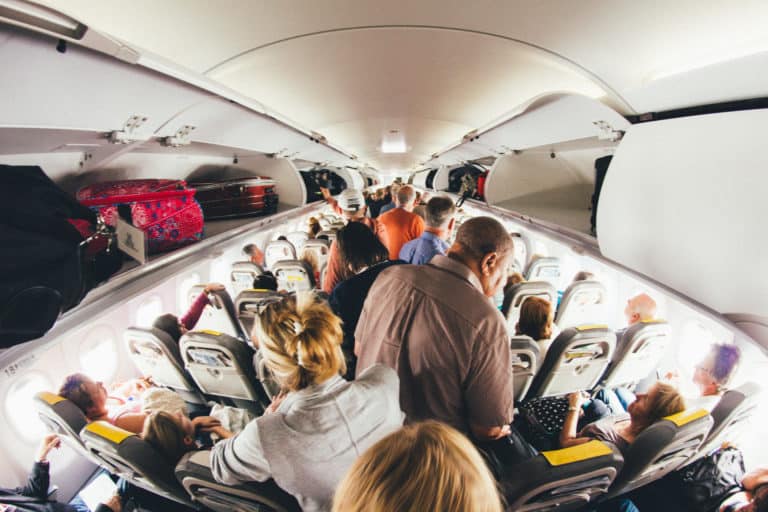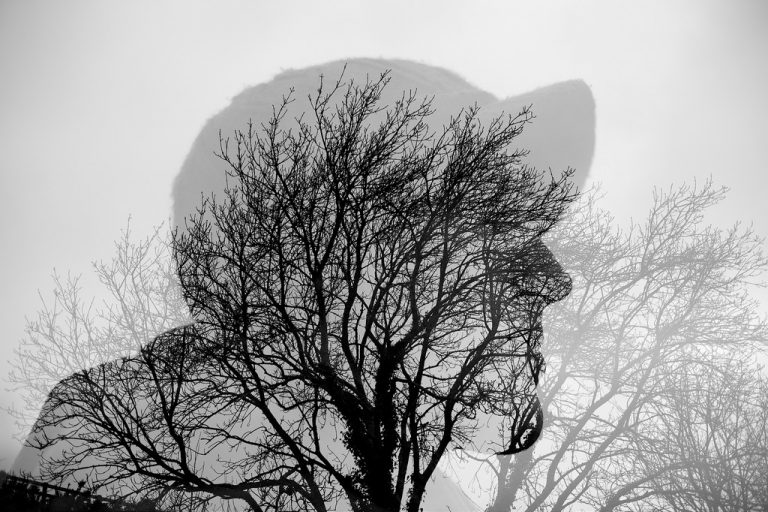
Image by Leo Hidalgo /Flickr, Some Rights Reserved.
Put On Your Own Mask First: The Safety of Self-Care
These days I find myself, all too often, crammed yet again into a tiny, uncomfortable airplane seat. I’d love to say that the journey itself is as important as the destination, but airline travel in the United States is a pretty depressing affair these days. Small seats bundled together, lots of delays. Domestic airline travel used to be a luxurious experience. No more.
That sense is also reflected in the tone of most airline hosts and hostesses. With the exception of a few airlines, most airline folks communicate the safety instructions in a voice ridden with the sense that I am only reading this because they make me read this. I usually try to put on my headphones and go to my happy place with some soothing music.
It takes a lot to jolt me out of my desire to focus as intently as possible on my own Sufi meditative music — typically something from the masterful Oruc Guvenc — when I fly. And yet there is one sentence from the mandated safety instructions that gets to me each and every time, jarring me out of my musically induced happy place:
“In case of emergency, air masks will drop the ceiling. If you are traveling with a minor, please put on your own mask before helping the minor.”
Each time I hear it, it unsettles me. Whether in scripture, poetry, or everyday life, the statements that unsettle me again and again are usually rubbing up against an aspect of my own life that I need to visit and revisit, again and again. Of course I would put on the mask on my own child first. My children are my life, the very essence of my life. I call them jan, which in Persian means “soul” or “life-force.” My parents call me jan-am: “My soul.” “My life-force.”
As parents, we get this each time we look into the eyes of our children. Our babies are our souls, the very light of our eyes, the very soul of our soul. We’d give our life for them, because they are our very life. A million times out of a million, we would sacrifice our own life to save our babies. Any good parent would.
I remember talking about this with my wife once; she said that we as parents typically eat cold food because we try to make sure our babies have eaten first. Of course we would put on their oxygen masks first. So in that case, why does this safety statement so unsettle me?
If it were simply that I saw this safety instruction as lacking in deep compassion, I would set it aside and resume the life that conforms (as I see it) to a higher path of compassion. No, I do not set it aside, because somewhere in me, I recognize that it, too, has wisdom. Yet, it does remind me of a life outside of airplanes that I witness all too often.
From the practical level, when there is a serious disturbance at a high altitude so that the plane cabin is depressurized, the passengers have a few seconds before they pass out from the lack of oxygen. They do not perish immediately, but, having passed out, they are in no position to put on their masks. Most minors cannot reach the oxygen masks that are too high for them to reach, or may not have the dexterity to put it on, or they may be too panicked to do so. So if the adult passengers try to put on the mask on the children first, they may well pass out before they have put the mask on the children. Even if they succeed, the child cannot reach the mask to save the adult. If the adult saves herself or himself, there is the hope of still saving the children.
It goes against that parental impulse to save the child. It goes against the most beautiful desire to sacrifice one’s own self to save the jan, the life force, the heart of yours that beats outside of your chest. But that very unexpected act of saving one’s own life first may well save the life of both the parent and the child.
I think about this as a metaphor for much of what I see around us. I used to think of the world as being divided between good people and bad people. Now it’s less clear than that to me. I see so many people trying, really trying, to do what’s right. Sometimes they are not able to do it in a beautiful way. Sometimes they are not able to do it in ways that are wise, good to the people around them, or good to their own selves.

I see so many people in struggling relationships, abusive relationships, no-longer-sustaining relationships, who stay in them because they want to do right by those around them. They give and give without being sustained by love and compassion.
I see parents, far too many parents, who stay in relationships that are no longer giving them the “oxygen” of tenderness and love, which they usually do for the sake of the children. It’s not my place to judge anyone else, particularly those who at the moment are struggling and trying to do what is right, or at least less harmful. But it does seem right to me to put my arm around these friends, and remind them to put on their own masks as well.
If they pass out from lack of tenderness (“oxygen”), they will not be able to provide any care to those they love so. Somewhere there has to be a balance of loving sacrifice for those we love, and providing loving care for our own selves.
When Jesus tells us to love our neighbors as our selves, it does imply that we practice loving care for our own selves as well. I don’t know whether to love the self first or the neighbor/child first, but both have to be done.
The world is complicated. Particularly in times of turbulence. Somehow, some way, we have to make sure that our own selves are nourished and sustained, in order for us to have something left to give to others.
It is a hard lesson, with no precise answer, particularly when the impulse to protect our babies is so visceral, so strong, and so lovely. As for the commandment of Jesus, to love the neighbor as one’s own self, perhaps to love the neighbor with one’s own self. He says: there is no commandment greater than this.
May we live up to the commandment to balance tender, loving care for those most vulnerable with the realization that sometimes it is our own selves who are also vulnerable and in need of (self)care. What wisdom, what wisdom, what life-giving beauty there is in this safety instruction.


